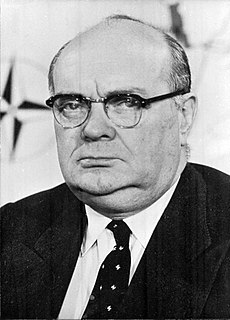
The 2006 United Nations Security Council election began on 16 October 2006 during the 61st session of the United Nations General Assembly, held at United Nations Headquarters in New York City. The elections were for five non-permanent seats on the Security Council for two-year mandates commencing on 1 January 2007.

The 2007 United Nations Security Council election was held on 16 October 2007 during the 62nd session of the United Nations General Assembly, held at UN Headquarters in New York City. The elections were for five non-permanent seats on the UN Security Council for two-year mandates commencing on 1 January 2008.

The 2009 United Nations Security Council election was held on 15 October 2009 during the 64th session of the United Nations General Assembly, held at United Nations Headquarters in New York City. The election was for five non-permanent seats on the UN Security Council to serve two-year mandates commencing on 1 January 2010.
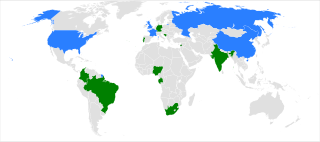
The 2010 United Nations Security Council election was held on 12 October 2010 during the 65th session of the United Nations General Assembly, held at United Nations Headquarters in New York City. The elections were for five non-permanent seats on the UN Security Council for two-year mandates commencing on 1 January 2011. The General Assembly elected Colombia, Germany, India, Portugal, and South Africa.

The 2011 United Nations Security Council election was held on 21 and 24 October 2011 during the Sixty-sixth session of the United Nations General Assembly, held at United Nations Headquarters in New York City. The General Assembly elected Azerbaijan, Guatemala, Morocco, Pakistan, and Togo, as the five new non-permanent members of the UN Security Council for two-year mandates commencing on 1 January 2012. Azerbaijan was elected after 17 rounds on 24 October, while the other four new members were chosen on 21 October.

The 1996 United Nations Security Council election was held on 21 October 1996 at United Nations Headquarters in New York City during the 51st session of the United Nations General Assembly. The General Assembly elected five non-permanent members of the UN Security Council for two-year terms commencing on 1 January 1997.

The 2000 United Nations Security Council election was held on 10 October 2000 at United Nations Headquarters in New York City during the 55th session of the United Nations General Assembly. The General Assembly elected five non-permanent members of the UN Security Council for two-year terms commencing on 1 January 2001.
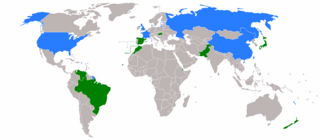
The 1992 United Nations Security Council election was held on 27 October 1992 during the Forty-seventh session of the United Nations General Assembly, held at United Nations Headquarters in New York City. The General Assembly elected Brazil, Djibouti, New Zealand, Pakistan, and Spain, as the five new non-permanent members of the UN Security Council for two-year mandates commencing on 1 January 1993.

The 1991 United Nations Security Council election was held on 16 October 1991 during the Forty-sixth session of the United Nations General Assembly, held at United Nations Headquarters in New York City. The General Assembly elected Cape Verde, Hungary, Japan, Morocco, and Venezuela, as the five new non-permanent members of the UN Security Council for two-year mandates commencing on 1 January 1992.
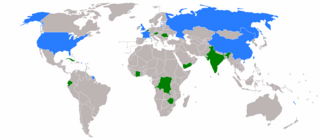
The 1990 United Nations Security Council election was held on 1 November 1990 during the Forty-fifth session of the United Nations General Assembly, held at United Nations Headquarters in New York City. The General Assembly elected Austria, Belgium, Ecuador, India, and Zimbabwe, as the five new non-permanent members of the UN Security Council for two-year mandates commencing on 1 January 1991.
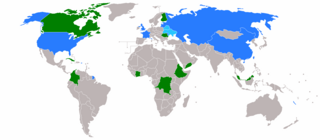
The 1989 United Nations Security Council election was held on 18 October 1989 during the Forty-fourth session of the United Nations General Assembly, held at United Nations Headquarters in New York City. The General Assembly elected Côte d'Ivoire, Cuba, Romania, South Yemen, and Zaire, as the five new non-permanent members of the UN Security Council for two-year mandates commencing on 1 January 1990.
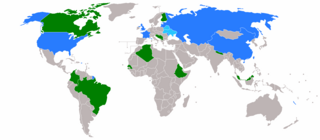
The 1988 United Nations Security Council election was held on 26 October 1988 during the Forty-third session of the United Nations General Assembly, held at United Nations Headquarters in New York City. The General Assembly elected Canada, Colombia, Ethiopia, Finland, and Malaysia, as the five new non-permanent members of the UN Security Council for two-year mandates commencing on 1 January 1989.

The 1987 United Nations Security Council election was held on 15 October 1987 during the Forty-second session of the United Nations General Assembly, held at United Nations Headquarters in New York City. The General Assembly elected Algeria, Brazil, Nepal, Senegal, and Yugoslavia, as the five new non-permanent members of the UN Security Council for two-year mandates commencing on 1 January 1988.

The 1986 United Nations Security Council election was held on 16 October 1986 during the Forty-first session of the United Nations General Assembly, held at United Nations Headquarters in New York City. The General Assembly elected Argentina, Italy, Japan, West Germany, and Zambia, as the five new non-permanent members of the UN Security Council for two-year mandates commencing on 1 January 1987.

The 1976 United Nations Security Council election was held on 21 October 1976 during the Thirty-first session of the United Nations General Assembly, held at United Nations Headquarters in New York City. The General Assembly elected Canada, the Federal Republic of Germany, India, Mauritius, and Venezuela, as the five new non-permanent members of the UN Security Council for two-year mandates commencing on 1 January 1977.

The 1984 United Nations Security Council election was held from 22 October to 18 December 1984 during the Thirty-ninth session of the United Nations General Assembly, held at United Nations Headquarters in New York City. The General Assembly elected Australia, Denmark, Madagascar, Thailand, and Trinidad and Tobago, as the five new non-permanent members of the UN Security Council for two-year mandates commencing on 1 January 1985.

The 1977 United Nations Security Council election was held on 24 October 1977 during the Thirty-second session of the United Nations General Assembly, held at United Nations Headquarters in New York City. The General Assembly elected Bolivia, Czechoslovakia, Gabon, Kuwait, and Nigeria, as the five new non-permanent members of the UN Security Council for two-year mandates commencing on 1 January 1978.
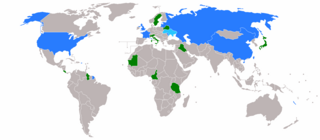
The 1974 United Nations Security Council election was held on 11 October 1974 during the Twenty-ninth session of the United Nations General Assembly, held at United Nations Headquarters in New York City. The General Assembly elected Guyana, Italy, Japan, Sweden, and Tanzania, as the five new non-permanent members of the UN Security Council for two-year mandates commencing on 1 January 1975.

The 1972 United Nations Security Council election was held on 20 October 1972 during the Twenty-seventh session of the United Nations General Assembly, held at United Nations Headquarters in New York City. The General Assembly elected Australia, Austria, Indonesia, Kenya, and Peru, as the five new non-permanent members of the UN Security Council for two-year mandates commencing on 1 January 1973.
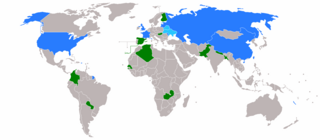
The 1968 United Nations Security Council election was held on 1 November 1968 during the Twenty-third session of the United Nations General Assembly, held at United Nations Headquarters in New York City. The General Assembly elected Colombia, Finland, Nepal, Spain, and Zambia, as the five new non-permanent members of the UN Security Council for two-year mandates commencing on 1 January 1969.




